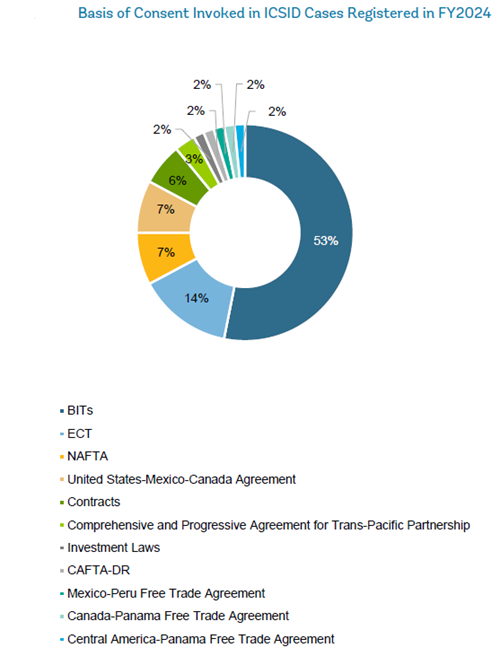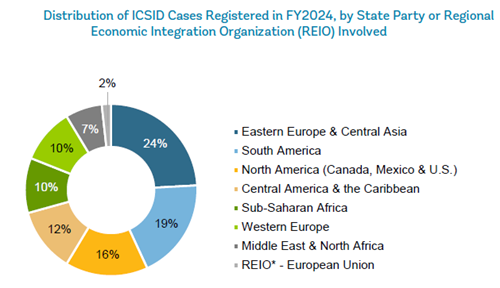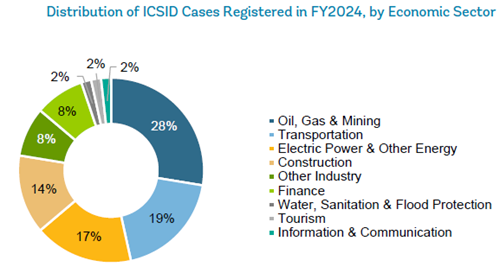The latest edition of ICSID’s caseload statistics report reveals a robust 2024 fiscal year across key metrics—including cases registered and diversity among ICSID arbitrators and committee members.
A total of 58 ICSID cases were registered in FY2024, which is the second highest in ICSID history. The majority were arbitrations under the ICSID Convention (53 cases), followed by arbitrations invoking the Additional Facility Rules (four cases) and one conciliation under the ICSID Convention.
Overall, 341 ICSID cases were administered in the fiscal year, which also ranks as the second most in a single year.
An additional 17 cases were administered under other procedural rules in FY2024. Thirteen of these cases applied the arbitration rules of the United Nations Commission on International Trade Law (UNCITRAL).
Among cases decided by tribunals in FY2024, 53% of awards upheld the investors’ claims in part or in full, 36% of awards rejected all of the investors’ claims on the merits, and 11% of awards declined jurisdiction. Such balanced outcomes between claimants and respondents are consistent with historical trends.
Basis of Consent
In line with previous years, bilateral investment treaties were the most common instrument invoked by parties in their requests for arbitration in FY2024. However, multilateral trade and investment agreements have increased as a basis for jurisdiction in recent years—and that is evident in the cases registered in the latest fiscal year.

Notable firsts in FY2024 were cases brought on the basis of the Comprehensive and Progressive Agreement for Trans-Pacific Partnership; the Mexico-Peru Free Trade Agreement; and the Canada-Panama Free Trade Agreement.
Regional Distribution of New Cases
In FY2024, the largest share of registered cases involved States in Eastern Europe and Central Asia (24%), followed by States in South America, (19%) North America (16%), and Central America and the Caribbean (12%). New cases were evenly spread among Sub-Saharan Africa and Western Europe (10% each). The Middle East and North Africa region accounted for 7% of new cases.
A Regional Economic Integration Organization (REIO)—the European Union—was a party to an ICSID proceeding for the first time. In the 2022, ICSID’s Additional Facility Rules were amended to accommodate REIOs as a party to ICSID proceedings.

Economic Sectors Involved in New Cases
Twenty-eight percent of new cases involved the oil, gas, and mining industries, and 17% were related to electric power and other energy sources. These sectors have historically accounted for the largest share of cases. The transportation and construction sectors were also prominent in FY2024, accounting for 19% and 14% of disputes, respectively.

Diversity and Gender Balance Among ICSID Appointments
Marking a new highpoint, individuals of 49 nationalities were represented among the 197 appointments made in the fiscal year.
In total, 11% of appointments involved individuals appointed for the first time to an ICSID case. Fifty percent of first-time appointees in FY2024 involved nationals of low- or middle-income economies and 23% were women.
Overall, women accounted for 29% of all appointments made to ICSID cases in FY2024 —an improvement over the 22% in FY2023 and 24% in FY2022.
Amongst the appointments made by ICSID—as opposed to appointments by the parties or co-arbitrators—43% were women.
About The ICSID Caseload - Statistics
The ICSID Caseload - Statistics contains a profile of the ICSID caseload since the first case was registered in 1972. ICSID has hosted the majority of all known international investment cases and The ICSID Caseload - Statistics is a valuable empirical reference about trends in international investment dispute settlement generally. It profiles various aspects of international investment cases, including the number of cases, the basis of consent invoked by claimants, geographic and economic sector distribution of cases, outcomes of proceedings, and the nationality of arbitrators and conciliators. The ICSID Caseload - Statistics is available in English, French and Spanish, and updated every 6 months.

